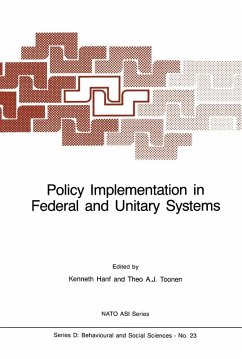
The Role of Bureaucracy in the Implementation of Federal Institutes (IFs)
The case of the IF in Passos (MG)
Versandkostenfrei!
Versandfertig in 6-10 Tagen
43,99 €
inkl. MwSt.

PAYBACK Punkte
22 °P sammeln!
The research addresses the public policy of professional education which, through the Expansion Plan for the Federal Network of Professional, Scientific and Technological Education, led to the creation of the Federal Institutes of Education, Science and Technology (IFs) and the opening of new teaching units in various regions of Brazil between 2003 and 2014. One of the units is located in the city of Passos (MG), whose implementation process was led primarily by actors from the institute itself, members of the public bureaucracy. These actors held commissioned positions in the Federal Educatio...
The research addresses the public policy of professional education which, through the Expansion Plan for the Federal Network of Professional, Scientific and Technological Education, led to the creation of the Federal Institutes of Education, Science and Technology (IFs) and the opening of new teaching units in various regions of Brazil between 2003 and 2014. One of the units is located in the city of Passos (MG), whose implementation process was led primarily by actors from the institute itself, members of the public bureaucracy. These actors held commissioned positions in the Federal Education Institutions which, in correlation/equivalence with the Higher Management and Advisory Positions (DAS), were classified as members of the federal government's upper echelon bureaucracy. But as we look at the work of these actors, we realise that it is much more related to the role played by the middle-ranking bureaucracy. Their work was mainly involved in brokering policy actions, applyingpolicy guidelines and coordinating actions between superiors and subordinates, in other words, in aspects that led to the implementation of public policy.












